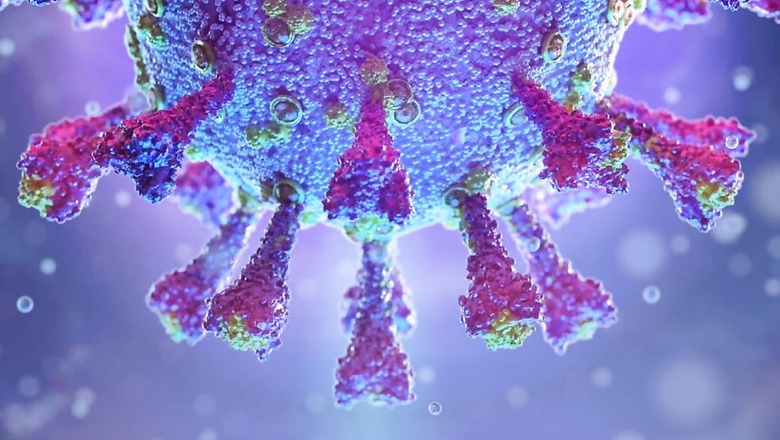
views
India’s vaccination drive has picked up pace to curb a likely third wave of the Covid pandemic. A new mutant version of the virus, the Delta plus variant, has emerged as a fresh cause for concern with cases being detected in parts of Maharashtra, Kerala and Madhya Pradesh. CNN-News18 spoke to eminent virologist and vaccine expert Dr Gagandeep Kang to get some insight into this latest avatar of Covid, the dangers it poses, and the ways to counter it.
Given the data that is available so far on the Delta plus variant, what is it that concerns you and scientists like you the most?
Well, at the moment, we don’t know enough about the Delta plus variant and its epidemiological and clinical consequences to be able to say how much of a concern it should be. We certainly know that it is on the background of the Delta variant, which has already demonstrated that it is the most transmissible strain in the world. There is also some evidence that it may lead to more rapid progression of disease to severity. And the concern with the Delta plus is that it has a mutation that has been seen in variants that are of greater concern for immune escape. So if you have a variant that is transmissible or variant that causes more severe disease potentially, and potentially is one that could escape vaccines, that could be a variant that could go beyond the ‘variant of concern’ to a classification that is called ‘variant of high consequence’. So we haven’t gotten there yet. We don’t have clinical information, we don’t have epidemiological information. So I think what we should be doing is trying to gather more and more information about the people that are infected with the Delta plus variant and the consequences of that infection in those individuals. What happened to people who were infected with this strain. Once we have 200-300 people who are infected with this strain and we know what happened to them, we’ll be in a much better position to see how much of a concern the Delta plus variant really is.
Does the Delta plus variant have the potential to evade vaccines? And is it always necessary that as a virus mutates, it gets more virulent, more dangerous and has more capacity to escape the vaccine?
So let’s take those two questions separately; in order to be able to understand whether a variant is able to escape vaccines, there are two things that we can do. One and the easiest is to look at samples that come from vaccinated individuals and look to see whether those samples have antibodies that are capable of neutralising the new variant in the laboratory. If we find that this variant is able to escape the antibodies that are present in the serum of people who have been vaccinated, then we know that we should worry. And to do this, usually you have a panel of many variants that you evaluate together so that you can compare this new variant with what has happened with other variants and whether those were neutralised or not. I understand that these studies are currently being done by ICMR, but we do not have data from that as yet. Even if we did have a situation where the lab data indicated that there was a reduction in the ability of the serum of vaccinated individuals to neutralise this particular virus, that does not necessarily mean that vaccines are not going to work because these are laboratory studies. They look at only one part of the immune system, which is the antibody-mediated immunity. In addition to these lab studies, we actually need real-world data in vaccinated people to see whether they are able to control the virus or not. What we have seen with the Delta variant, the parent variant, is that vaccines work slightly less well, but do prevent severe disease very well. So 71% with a single dose and 92% with two doses of the Covishield vaccine protects against severe disease with the Delta variant. Will this hold out for the Delta plus variant? We will only know when we have enough people who have been vaccinated, infected with the Delta plus variant, where we get both the clinical information, as well as the sequence information for those individuals. In summary, we don’t have the data right now to tell us how well or badly we will do with vaccines against the Delta variant.
To take that point forward, the Delta plus variant has some elements of the Beta variant as well, which has some degree of capacity to escape vaccines…
So I think the important thing to understand is that the Beta, which is B1351, does perform less well with vaccines than many of the other variants that we see, the Alpha variant for example. Now, this is supposed to be because we have a particular mutation, K417N mutation, which is also being seen now in this Delta plus variant. Now the problem of course is you cannot ascribe an escape from vaccine response to a single mutation. Yes, this new variant has signatures of its parent and signatures of the Beta variant. But that does not mean that functionally it will acquire the worst characteristics of both. We won’t know that till we evaluate. Remember that the same thing actually happened with the Alpha variant way back in February. The Alpha variant also acquired additional mutations in the same location. In fact, it acquired the E484K mutation that was believed to be one that was going to be really, really important for the immune response. It turned out that the daughter variant behaved no different from the parent. And we don’t worry about that as much now. We continue to track it, but we are not worried about it because we know that it’s not behaving differently. So it may be that the same thing will happen with the Delta plus variant. But right now we don’t have the data to tell us that. Now you have also asked about evolution and viruses will constantly evolve to become more dangerous. Actually, that doesn’t happen. And one way to think about it is to say, you know, what is of the most advantage to a virus. What is of most advantage to a virus is its ability to spread, to find a new host and to be able to replicate and spread to other individuals. So for a virus to become more transmissible is a distinct advantage. For a virus to become more dangerous, to cause more severe disease, is not an advantage to the virus because the chances are that it will kill its host.
Now if the host dies, because they have been infected with a particular virus, then your transmission in the population actually slows down. So that is a disadvantage to the virus. Now, when it comes to immune escape, do viruses want to evolve to escape the immune system? Yes, they do. But the fact is that our immune system has actually been very, very good at shutting down virus replication in most people who are infected and most people who are vaccinated. Because if we look at continuing replication, we don’t see it, we see it in an occasional person. So for example, there was just recently a news report about a man in the UK who was infected for several months and had replicating virus isolated from him on several occasions. He was unable to suppress replication of the virus and finally had to be treated with the Regeneron antibody cocktail. And that finally shut down the virus replication. But that is a very rare case. In most situations, our immune systems make sure that the virus stops replicating. And usually, it stops replicating within a week of people developing symptoms, about two weeks after they have an infection.
In Madhya Pradesh, of the seven people who have been diagnosed with the Delta plus variant, one is a toddler. Is that an indication that the Delta plus could perhaps attack younger children?
So I think that there is a report also of a child being infected in southern India. But I think what is frequently ignored is that children are getting infected all the time with all the other variants that we have seen so far. It’s just that we don’t sample children as much because they rarely have symptoms. Children are better able to have infection with SARS-CoV-2 than adults are. I see no reason why the Delta plus variant would behave any differently from any of the other variants in terms of susceptibility across each group. I anticipate that it will be more severe in older individuals, just like all the other variants have been.
Given what we have seen in the last 18 months, will the Delta plus variant hasten and subsequently drive the third wave? And when is this third wave coming, according to you?
I think you should ask me this question after we have a little more information on the Delta variant. I think one of the things that’s important to recognise is that so far we have begun to worry about this at a very early stage. Compared to what we did with Delta, with Delta plus with 20-40 cases, we are already in a situation where we are wondering if we need to panic or not. I think we need to wait a little longer. The most important thing is careful data collection and a lot more sequencing so that we can identify more people who are infected with this variant and study what happens to them. Once we understand what is happening to them, we will be able to predict better what is likely to happen. Yes, we can have a third wave, but the drivers of the third wave will be behaviour, first and foremost, and only after that, the characteristics of the variant. So I think it’s very important to recognise that we are not in a situation right now to predict when the third wave will happen. And for all the predictions, the timing, the scale, a lot will depend on how we behave, how many of us have been previously infected, how many of us have been vaccinated, and last, how the variant will behave.
Read all the Latest News, Breaking News and Coronavirus News here.


















Comments
0 comment